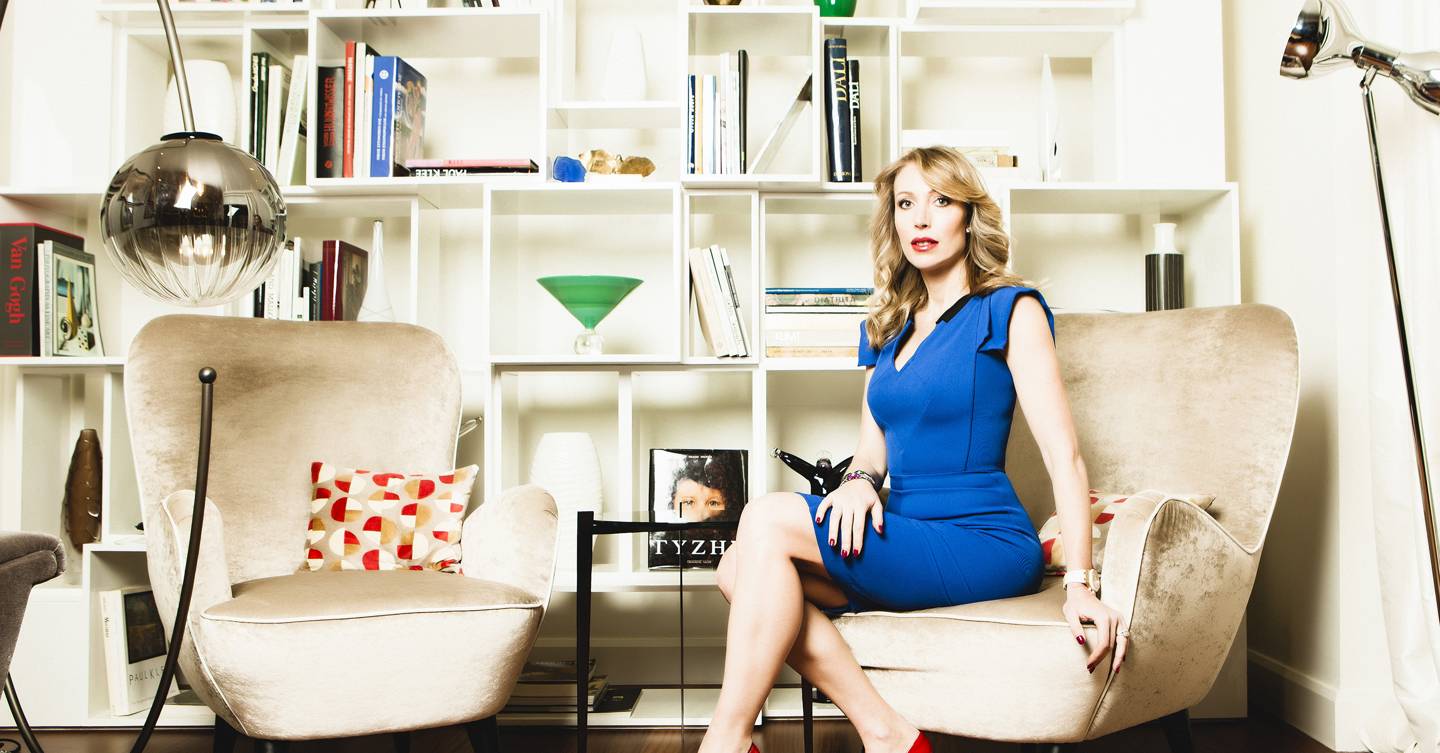Have you ever dreamt about starting your own business but never known where to begin? It’s a common problem – one that is often made more difficult simply by being a woman. From securing adequate funds to being taken seriously enough, gender inequality has meant it’s no easy feat getting your business off the ground. Here, some of the world’s most kickass female entrepreneurs reveal their top tips for creating a successful business.
Tania Boler – CEO and Founder, Elvie

@taniaboler / Instagram
Make the right connections
There is a strong sense of solidarity between women in the tech space. Supporting one another at every step is key for everyone’s success and I definitely felt this during our fundraising stage at Elvie.
It was these initial contacts that helped introduce me to the right kinds of investors. Those who had the same vision and values as I had for Elvie. We now have some great female investors including the Allbright Fund, led by Debbie Wosskow and Anna Jones, which brings together female angel investors.
Do your homework
Before I founded Elvie and we launched our first product, I definitely didn’t know everything about business or the world of tech, so my first priority was to speak to people who did. I got in touch with investors even at times when we weren’t raising money so I could get more general business insights and advice. If they asked about investing or showed any interest, it meant that I could explain that we weren’t fundraising at the time and that this was about building relationships and knowledge. And of course when the time did come for investment, I had a list of interested parties.
In the pitching process itself, knowing the numbers and the details of your business inside out is a no-brainer. I also made sure I took in as much intel as I could by reading a lot of books, the best of which was Lean Start-up – it was a game-changer. It really helped me work out how to design a product based on what women wanted, building compassion and innovation into everything we do in an industry that is still largely dominated by men.
Obviously there will always be things you don’t know. That’s fine too, as long as you have a plan for yourself and your business.
Pitch with confidence
Raising money is a bit like dating: you need to be confident, in control and – to a certain extent – let them come to you.
I found switching the pitch to let investors pitch to you was another great way of finding my calm and collected self while also ensuring values were aligned.
Have a thick skin
Rejection is part of the game. But the good news is that with rejection comes resilience. Most people thought I was crazy when I pitched my ideas for Elvie; there had never been a start-up focused on women’s issues before. You have to focus on the end goal, learn not to care too much about what other people think and keep going! If you have a great idea and it helps to improve lives, that should give you the stamina to make it happen.
Jasmine Wicks-Stephen – Founder, Faace

@jas_ws / Instagram
Understanding what is and isn’t going to worth your investment
Knowing what is and isn’t going to be worth your investment. Investment in terms of money of course, but also your time. To do anything well, you’ve really got to be willing to sacrifice a lot of your personal time and if like me, you’ve already got a full time job, then you’ve got to be willing to put in those extra hours at the cost of your other relationships (temporality), so, you need to ask yourself if that is going to be worth it, before you begin. And maybe okay it with whoever is going to have to pick up the slack. Then, there’s also the consideration of whether something is actually likely to be worth the investment. If you’ve ever spent a lot of money on something – a wedding, a house renovation – then you know, there’s always hidden costs. Starting a business is no different, so it’s important to do as much research as you possibly can before you begin. Look at market reports, consumer behaviour, google trends, news trends, social media trends – soak up all the intel you possibly can. Despite what some might say, overall, don’t just go with your gut. You need a robust proposition if you’re going to get investment, or to even make it worth your while of investing any money at all, and the only way to guarantee this, is to plan, research, and plan some more. Even then you’re still going to need an element of luck.
Just getting started
When you first have an idea, knowing how to make it come to fruition can feel really overwhelming. You just need to start with a plan of action, you don’t need to actually action it all in the first instance. Sometimes just the task of putting pen to paper, or tapping on a keyboard, is the only way to begin. Empty the contents of your brain on the page and then you have the start of your plan. After a day’s work at my comms agency, feeding, bathing and putting a very reluctant two year old to bed, I’ll sit down with a Chocolate Éclair (I need the sugar hit), and add to my list. Whilst out and about all day, I take pictures of things, screenshot ideas and write emails to myself, where I save them all down in one ‘Ideas’ folder. This then all gets added to my ongoing doc which is where everything for my business stems from.
Then when you’ve got thoughts about what you’re doing – from the caption on an Instagram post, to a design on a box, or whatever, think about it, and overthink it. It’s the only time I’d encourage overthinking, but unfortunately, just relentlessly going over stuff in your mind is probably the only way to ensure you’re onto a good plan.
And really there is no hidden secret, it’s a lot of hard work and choosing what you prioritise with your time. I watch TV and work most evenings until late, I haven’t cooked a meal in two years (thankful for M&S), but I do take an afternoon off each week to spend it one-on-one with my son.
You need your network
Everything and everyone has to start somewhere and so it’s worth leaning on your own network in the first instance if you can. Tell everyone what you’re doing and what you’re trying to achieve and you might be surprised by how many people really want to or are even able to help you. I really do believe that a key to being successful is recognising what you can do but most importantly what you can’t. You’re probably not great at everything, and that’s ok. It’s a talent to recognise other people’s strengths and use them to support your own.
Pre-plan within an inch of your life
Pre-plan within an inch of your life and you’ll still make mistakes and forget stuff. You’re not a robot. I remember waiting and waiting for what felt like forever for our products to be finished. We had a date in mind and then suddenly, an email entered my inbox saying they were going to arrive a month earlier than expected. I messaged all the team and said ‘oh sugar (not sugar), Faace is arriving in a few days’. They kindly replied with things like, ‘you can use my spare room’ (whilst I’m sure thinking what the…’, – that’s what I was thinking… I have a two year old, and a two bedroom flat that’s already a big plastic, primary coloured mess and now, I have thousands of Faace masks turning up, what am I actually going to do?! Anyway, luckily, I have a very helpful friend who has a very helpful company and all was well in the end, but no matter what, they’ll always be a mini drama. So, don’t sweat it if you can.
Keep the focus and the faith
Don’t scrimp on the finer details or you’ll regret it. There are times when you’re investing money in something and it’s tempting to cut corners, but don’t. Maintain your vision, keep focused and believe in it. That vision always intended for it to be the best it can, so just keep going. Keep the faith and just work harder to get everything where you always wanted it to be.
Sherrille Riley – Founder and Director, Nails & Brows
Make a plan
Map out a detailed business plan of your financial forecast and be sure to include an allowance for miscellaneous costs, usually about 10%. Unforeseen costs always crop up no matter how well you plan.
Work out how much investment you need and list what you intend to spend it on
The clearer you can be about this and how it will benefit the business, the more attractive your proposals will be to investors.
Decide what you are willing to give for the investment and be willing to negotiate and compromise
This step can be lengthy and must suit both parties.
When it comes to raising funds – do your research
There are various ways of securing investment outside of the traditional norms. Think outside the box. There are schemes available like SEIS and EIS which invest in product & service start-ups creating innovation & building brands.
Get a legally binding contract in place for you and your investors which must contain the terms and conditions around your investment.
Beth Noy – Founder, Plastic Freedom

@bethnoy / Instagram
Own your skills
I have been in a lot of business meetings in the past where I have been overlooked because I was a woman (I used to work in a male dominated industry). I have learnt that by owning what I know and by speaking with confidence is the most effective way of earning respect.
Always have the facts
Another way to command attention and respect from those around you is by backing up everything you believe and know with solid facts. So far example by demonstrating that sales have gone through the roof from a certain campaign or by providing market research or a campaigns sales history and stats to really nail home your idea. It’s important to ensure all your personal decision-making is also backed up with solid evidence, or examples of where it has worked before.
Be passionate
The main reason my business has succeeded is because people can see the pure passion I put into everything I do. I believe in my business and I believe in myself. This means that people trust in you and it makes you a worthy investment. You wouldn’t back someone that doesn’t think they can achieve the world and more, so show nothing less than that!
Have back up plans for failures
Every business will experience failures but by accepting this and having back-up plans ready is what will set you apart from the rest. e.g. If you don’t hit the target you want this year then what are you going to do about it? How will you make sure that doesn’t happen again? What will you have learnt from it? Every single ‘negative’ I see as a positive because it’s what allows you to learn and push onto greater things.
Remember not everyone is the same
Someone may hate your business plan or think it’s not going to succeed but all humans are different. If one person doesn’t like an idea, it doesn’t mean your ideas are wrong, you just need to find the right person to believe in you. There are so many different personality types and people in the world that you are targeting different consumers e.g. you may not be in the market to buy the brand new razor from Gillette, but there are people all over the world that are.
Crowd Funding
When I outgrew the space in my house (I ran Plastic Freedom from my spare room for 11 months) I decided to run a Crowdfunding campaign to eliminate some risk. There were a few reasons behind this; I didn’t want to get a loan from a bank where they would gain interest to spend on ‘dirty’ industries that didn’t align with my business ethos. I also wanted to give people the chance to help the plastic free movement grow. I did this by giving rewards and gifts for different pledge amounts and those who helped me on the first leg up will always be a fundamental part of Plastic Freedom’s history (their names will be going on the wall in our new warehouse). By crowdfunding you are making people part of your business and gaining loyalty/customers for life so it’s not only great for your business but the customer too.
Save money
The constant struggle I have running my business is sourcing the money that’s required to grow, quickly. The business has grown massively over the past two years but I’ve had to take my time over it, which can be restrictive. You have to listen to trends and what consumers want, then act on it quickly, even without a proper saving plan and having that cash available. You can shoot yourself in the foot. I am a lot better at this now but this was a learning curve over the years!
Investing in ideas that work
I sold out of nearly all my products in the first weekend and reinvested every last penny right back into the best-selling stock whilst expanding the ranges I had to offer. This is the business plan I still stick to, to this day. It sounds obvious, but to offer choice and quality products that I recommend myself is something you can’t really fault. If something works then repeat the process, if something fails then learn from it and move on.
Look for the niche in the market
If you are looking for investment at any point then your offering has to be unique and filling a gap in the market. There may be similar ideas already out there already but you need to think about how you can do it differently or better, which is what constantly pushes me forward. You have to always put yourself in the consumers shoes and think about what you would want as a customer. If there is something out there you can’t currently get or is lacking somewhere, then you’ve found your gap.
Michelle Kennedy, CEO and founder of Peanut, the social network for women across fertility and motherhood.

@michellekennedylon / Instagram
Do your market research
Prior to launching Peanut, I didn’t rush the process. I researched the market, I researched my proposals, I spoke to hundreds of women, I took my time. I set my own timelines and goals, and I wanted them to be realistic so that I knew I could hit them. As I had recently become a new mother myself, I knew that there was a product missing in terms of a safe and secure social network for women. Using my experience working for Badoo and Bumble, I combined my tech expertise with the emotions of becoming a new mother, to create a product that many other women also needed in my position.
Pitch when the time is right for YOU
Something I didn’t always do, but am now more confident to – waiting until I am in the best possible position to pitch. People will often offer you introductions, and you want to accept, but you must only do so at a time which makes sense for you, when you can take true advantage of the possibility. You only get the opportunity to make a first impression once.
I also now know that it’s ok to be selective about who you pitch to (whether that be for investment, partnership or hiring). If you have a clear vision about who you are as a company, as a brand, what the business is striving for, it can only be in the best interests of success to be true to this. That means some opportunities may just not be right. I have very much learnt how to master having confidence in the word ‘No’. Sometimes the most exciting developments can come from this.
Be proud of your successes
Learn to celebrate each and every one of your achievements, no matter how big or small they are. As a woman, I feel this is even more paramount especially with so many women suffering from Imposter Syndrome in the workplace – 60% of women who have considered starting a business did not because of a lack of confidence. If women learn to celebrate each milestone, it will allow us to build confidence and in turn, have a positive effect on business growth.
Support other female entrepreneurs
Last year, female founders received just 2 per cent of the venture money available to entrepreneurs last year. Two per cent?! Last I checked, women made up 50 per cent of the population. It’s stats like this which make women feel unable to make the start, take the plunge, to fear an outcome where the odds are already clearly so stacked against us. Some pretty incredible things have happened to Peanut since we launched. More female investors, more female entrepreneurs, and more conversation around the two.
Grow your network
One of the most important lessons I have learnt through starting my own business is to understand the value of my network, whether personally or professionally. Every person you meet might have an impact on your journey. For me, my network is made up of a range of people who support what we’re doing from potential investors, developers, to women who use the app – all of which are fundamental to our growth and developing Peanut. Whether that is right now, or at some point in the future, know that every person you meet is part of your journey.
Eva Alexandridis, Co-Founder of 111SKIN, 111CRYO/HEAT and 111SPA/CLINIC

– Skincare is a highly saturated market with many of the traditional super brands dominating the sector. For our initial launch we were fortunate for two predominant reasons. Firstly, the line was created by my husband, a leading plastic surgeon based on a product with a proven track record that he had developed and used on his patients as a part of their post-surgical aftercare at his 111 HARLEY ST. clinic. We were also an early part of the movement towards niche doctor beauty brands so we had even more confidence that the market would be receptive towards skincare based on clinical research.
– One of the biggest struggles in the early days was juggling trying to manage the finance in order to launch 111SKIN, all whilst being pregnant with my second child. My husband and co-founder spends more than half of his working day in surgery and what is left consulting with patients, so the time he was able to invest himself in this part of the business was understandably compromised. It involved significant amounts of travel, sometimes long distance, which took me away from my other son who was still very young at the time. Some I met with I’m sure may have questioned my commitment to what we were trying to achieve given my time too would be compromised as a mother. It’s a challenge that many women face, however looking back, I wouldn’t change it as the pregnancy inspired us to create as clean a brand as possible whilst still maintaining efficacy. 111SKIN products are all paraben, paraffin and silicon free and we were using recyclable glass packaging from the very start. It also allowed me to chart all the changes to my skin and body as we wanted to create a line that addressed as many everyday skincare issues as possible.
– One piece of advice I would share with anyone seeking investment for a new launch would be to start small and rely on friends and family. You need to learn the business and be very conservative with your expenditures. The worst mistake is to start investing in marketing before you have a solid product. All of my efforts went in investing in product formulations and only when you start having strong organic demand for your products you can the invest in events and marketing in order to educate your consumers
– The other suggestion would be to research and listen to advice. Knowledge is power and the better informed you are, the more likely a potential investor is to take a risk on you. It’s also important to take advice from those who have gone through the process. I was pleasantly surprised at how helpful some people were with their time and advice so I now make sure to always take the time to try and assist others wherever I can.
– Finally, don’t take any rejection or advice negatively especially when it comes from any family members who you may have approached. Respect the boundaries so it doesn’t affect your personal relationship with them. It’s a rule that my husband and I have continued to follow in our day to day running of the company as a married couple!
